Affiliate links on Android Authority may earn us a commission. Learn more.
Google might just be on to something with gaming Chromebooks
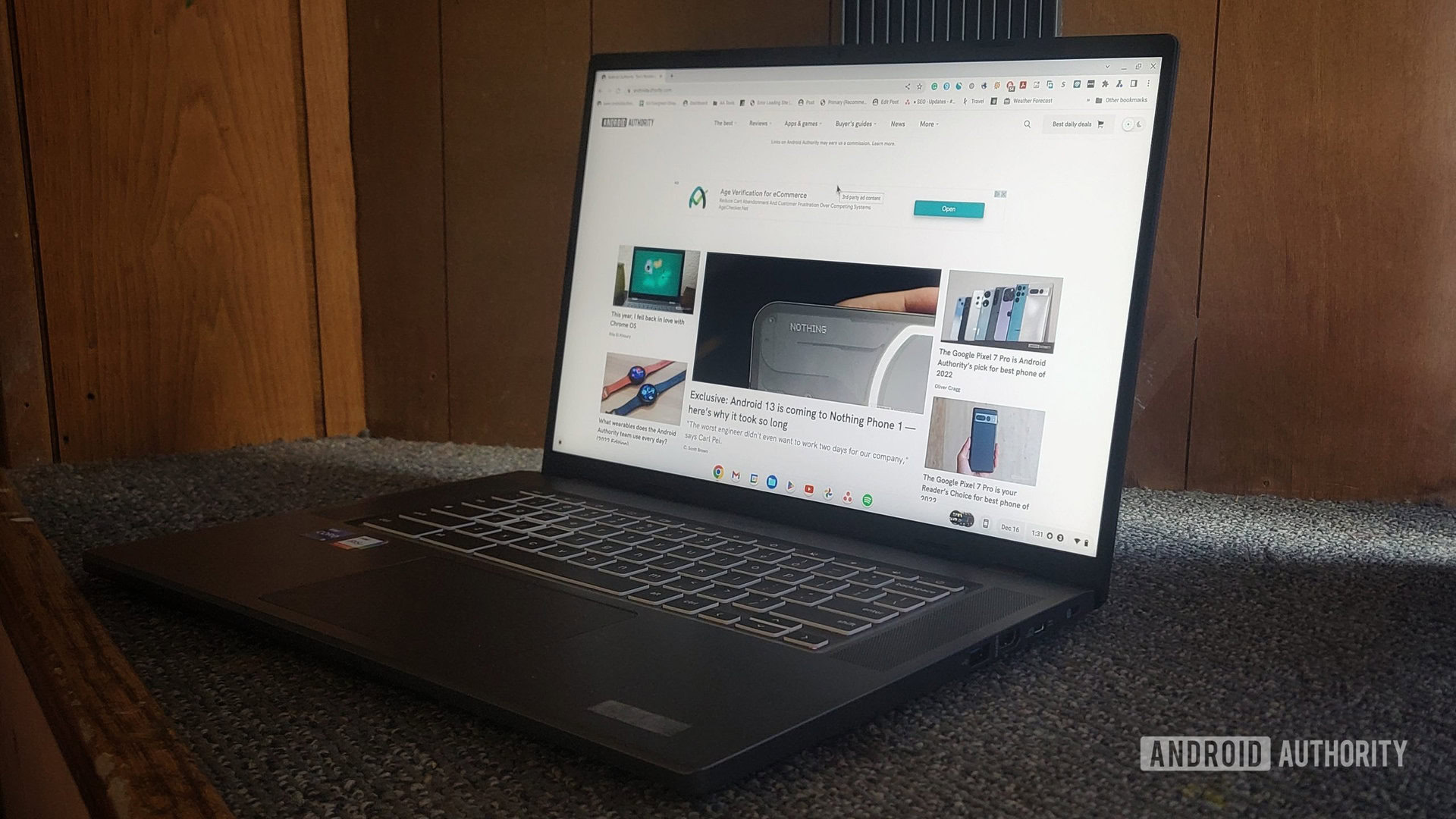
Back in mid-October, Google revealed its first three Chromebooks officially designed for game streaming. At the time, I wondered if a gaming Chromebook actually made sense or if this was just another rushed idea that wasn’t fully ready for prime time. As it turns out, the answer is a little bit of both.
Over the last nearly two months, I’ve had the opportunity to use the Acer Chromebook 516GE as my primary machine for work and play.
The hardware looks good, the screen is vibrant, the keyboard is wonderful to type on, and it has plenty of power for my everyday workloads. As long as you have the connection to support it, streaming games can look and play pretty nicely, though glitches and slow-downs will happen once in a while. Even Steam support is actually surprisingly good, though it’s still a beta feature.
After using the Acer Chromebook 516GE I’m convinced that gaming Chromebooks make a lot of sense. There are many reasons why a gaming Chromebook could be a good move for both Google and consumers. Unfortunately, there are also reasons why gaming Chromebooks will likely never live up to their full potential. At least not anytime soon.
What Google has to gain by pushing into gaming Chromebooks
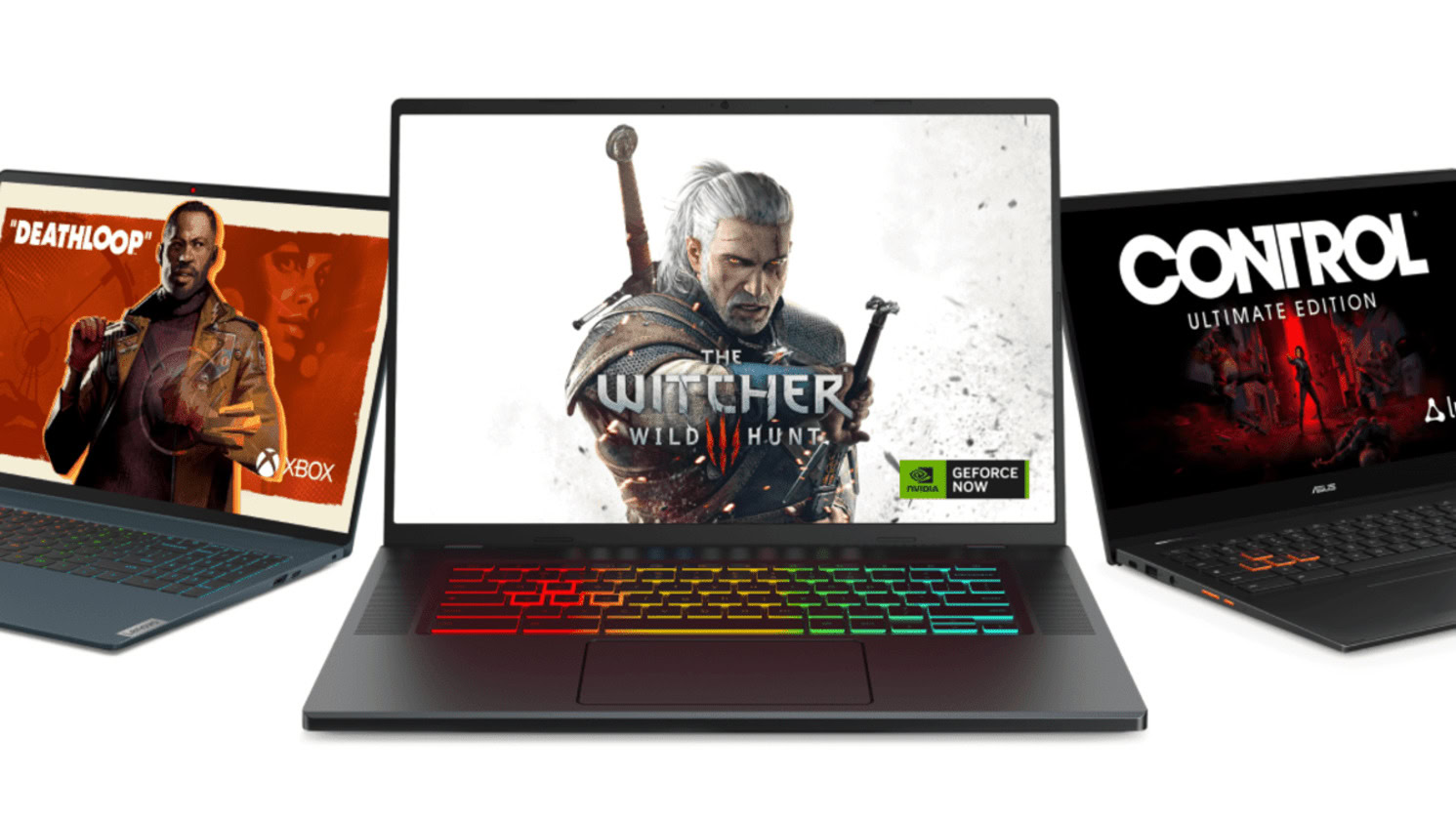
For years, critics have panned Google Chromebooks for being cheap web portals and little more than that. Despite this, the Chromebook market has grown immensely over the years, even overtaking Apple in the education sector. But lately, fortunes are starting to slip a little.
The pandemic has been very hard on the economy, but laptop sales remained relatively strong due largely to the rise in working from home. It’s not just that, however. Lockdowns also meant more of us were stuck indoors for long stretches, so PC gaming also saw an uptick during this timeframe. Unfortunately, the story is different for Chromebooks right now.
Chromebook shipments are at the lowest they’ve been in five years for both educational and consumer demand. Some of this downslide is due to school budgets tightening during the pandemic amid school closures and other issues. Chromebooks also last a long time and so they don’t need to be upgraded very often. Still, I argue another reason is the pandemic itself.
Google built a cloud-first platform, and it’s a good one. It’s faster for most basic tasks, sips battery life even on more advanced hardware, and it’s relatively safe from viruses and other malware. There’s just one problem: Many consumers still think it’s not a real laptop.
Chromebooks are still thought of as less than a real laptop, but gaming could help change this.
Those buying computers right now are mostly investing in machines they feel are good for all their needs, both work and play. That’s just not something Chromebooks have a reputation for.
Google needs to continue to drive the message that Chromebooks are cloud-first but this doesn’t mean they are all basic entry-level machines. It should do this by showing off the versatility of its platform and shaking the misconception that Chrome OS is just for browsing the web. Gaming is often associated with high-end hardware, so if Google can convince mainstream users that a Chromebook is gaming-capable, this could really help its image a lot.
Winning over gamers would also expand its market reach. 60% of all Americans play video games daily. Globally, there are now three billion active video gamers.
Even more crucial, 59% of gamers are aged 34 or under. These are the same individuals who may have grown up with Chrome OS in schools. People tend to stick to a platform they know as long as it meets their needs. Adding advanced capabilities like gaming helps Google better meet these needs. Those are just a few ways that Google could stand to benefit if it can make gaming Chromebooks a success.
Okay, so I can see why from a business perspective Google might want to push into gaming. But is it actually a good move for gamers? It could be. After all, not every gamer wants to be tied to Windows, so having more options is a good thing. Just take a look at the Steam Deck, which has proven immensely popular despite running its own Linux-based platform, Steam OS. Sure the Steam Deck can technically run Windows, but Steam OS is the default OS and most gamers are embracing the Linux-based platform. Even Mac owners are increasingly getting into games, largely also thanks to Steam.
There’s a growing demand for gaming machines beyond Windows PC, but it will only matter if Google can figure out the right approach.
Chromebooks could be beneficial to gamers, but only if Google thinks beyond just the cloud
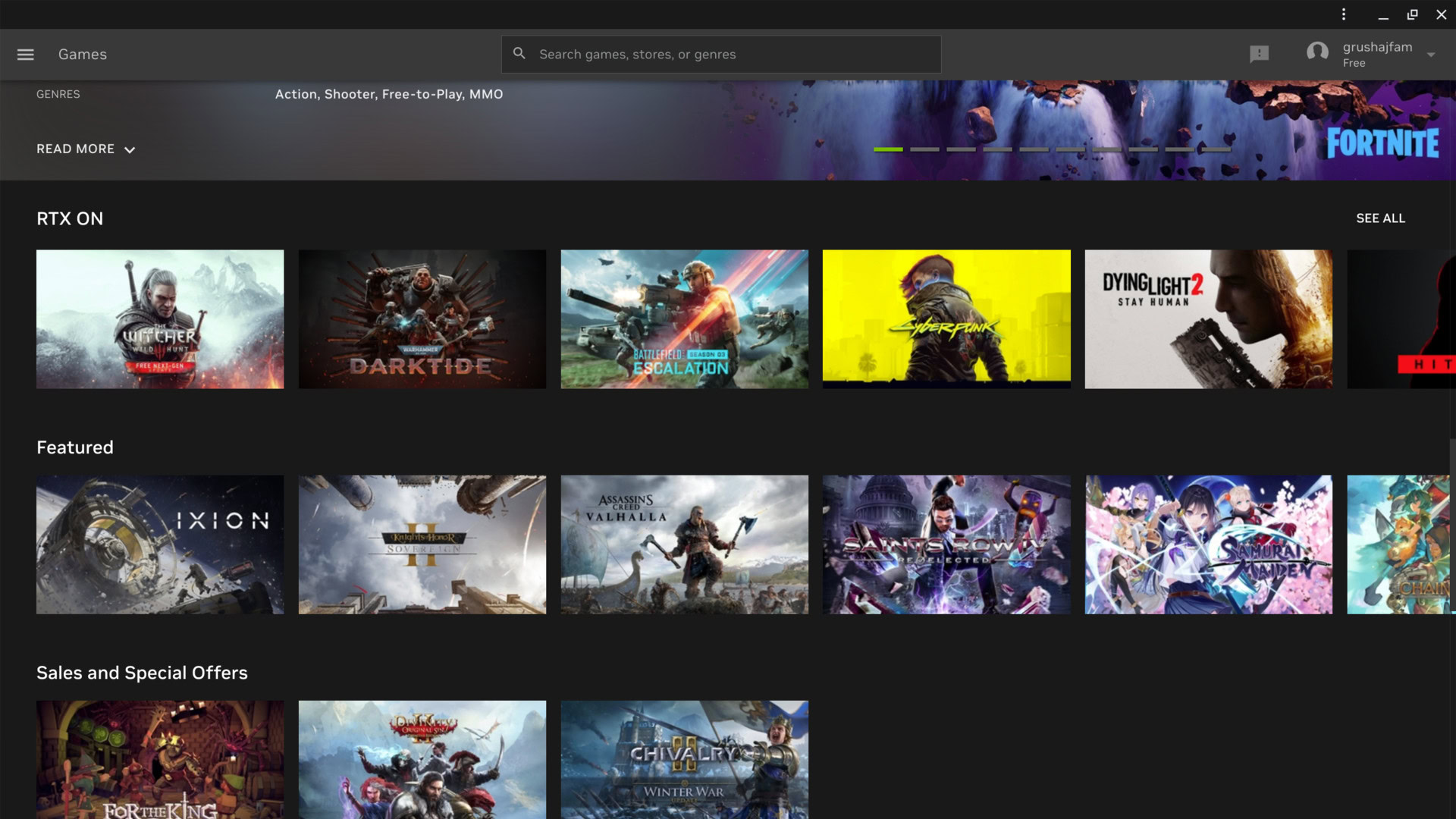
PC gamers are often more tech-savvy than console or mobile gamers, though obviously, that’s not always true. Part of this is because a good gaming rig can cost a lot, so more casual folks aren’t investing in them. But it’s also down to Windows. Windows requires more maintenance than macOS, Chrome OS, or Linux. Malware is more common, and Windows has a reputation (fair or not) for being less stable. This means PC gamers need to be more knowledgeable to keep everything running smoothly.
If you’re a gamer but don’t want to mess with the more technical aspects like Windows maintenance, Chrome OS would certainly prove easier to use. It’s also cheaper than going the Mac route and has less of a DYI approach than most Linux machines.
Chromebooks also don’t have the virus problems you’ll find with Windows, thanks to their sandbox nature. Setting up a Chromebook takes literally a few minutes. They are also cheaper than most Windows machines, even when comparing similar hardware specs, due to the costs associated with Windows licensing. Chrome OS is cheaper for OEMs to use and that allows Chromebook makers to keep the costs down a little. The barebones web-first nature of the OS also means it’s less resource intensive to begin with so it runs better even on less powerful specs.
Gaming Chromebooks need more than just cloud gaming if they want to really turn heads.
The real problem for Chrome OS is cloud gaming isn’t enough to win over gamers. The Acer Chromebook 516GE handles game streaming really well, as we imagine is a similar case for the other two laptops in the program. But as we mentioned earlier, game streaming requires a flawless internet connection. When that’s not present, the Chromebook effectively becomes a doorstop for gaming.
For example, I ran into several issues using the Chromebook for streaming sessions when going to coffee shops or even during the weekend we stayed at a hotel. As a ROG Zephyrus G14 user, one of the most appealing things is that I can play my games anywhere with almost the full power of a PC behind me. That’s simply not the case for gaming Chromebooks. Without local gaming support to round out the experience, gaming Chromebooks will probably never turn enough heads to get noticed. The fix is within reach here too.
Chromebooks are already capable of mobile gaming and Google could bring a bit more focus to this by adding perks like a free Google Play Pass subscription for the first year of ownership or something similar. Yes, we know mobile gaming still won’t cut it. That’s where Steam comes into play.
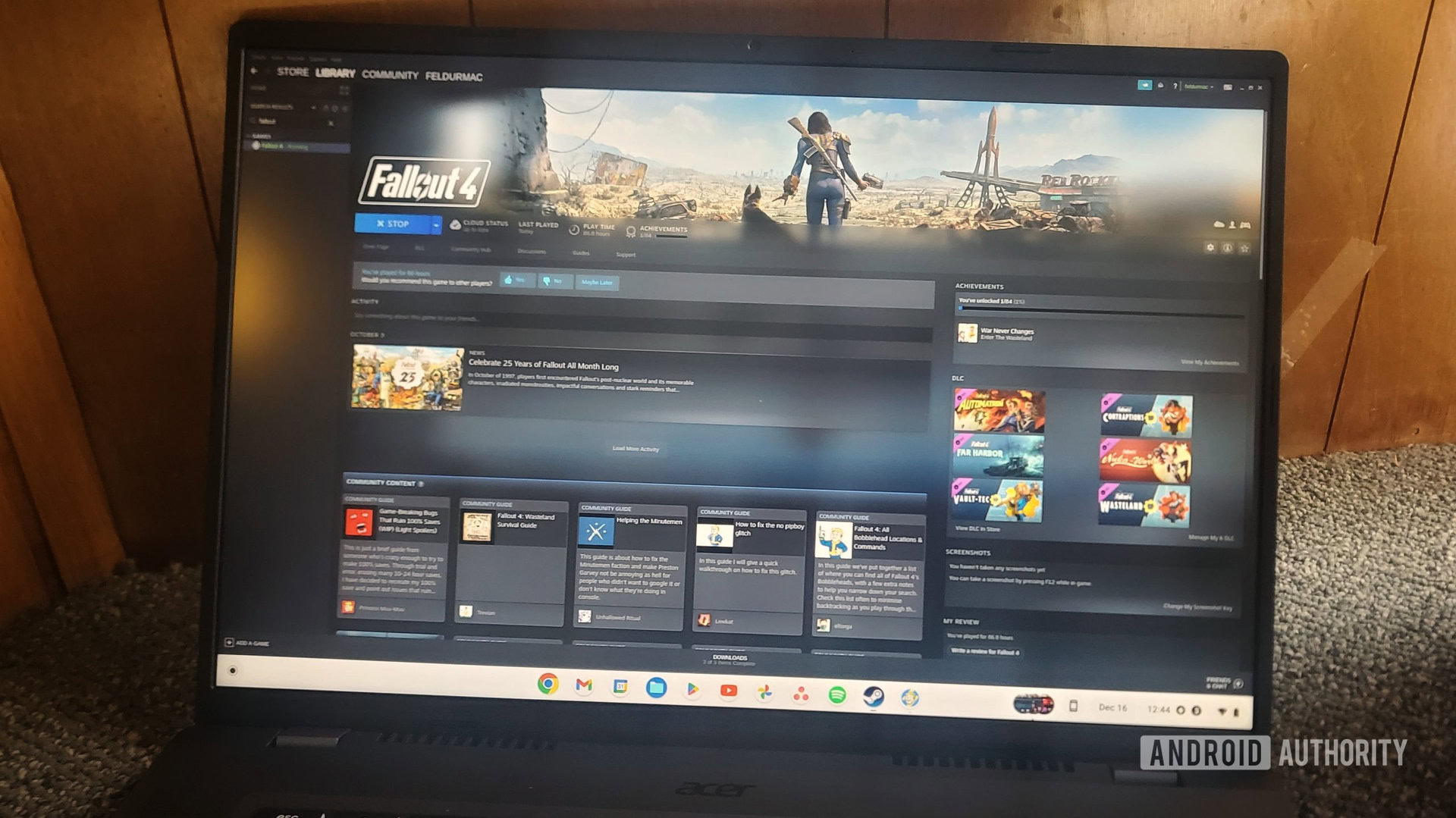
Right now, Steam for Chromebooks is still a beta product so it can’t be an official part of Google’s gaming strategy. Hopefully, this changes in the future. I really feel Steam is what will help create a complete package for gaming Chromebooks.
The Acer Chromebook 516GE is one of the few Chromebooks designed to run the Steam Beta, which I eagerly installed after switching the Chromebook over to the beta channel. As it’s still just a beta, you’re not going to get a perfect experience, but I was actually blown away by how functional it is.
I ran Fallout 4 without any hiccups or fuss, though I did have to adjust all the settings down to low. Stellaris ran flawlessly, even with all my various mods and expansions, at medium settings. Games like Disco Elysium also played beautifully with up to medium settings. Pretty much any non-intensive game on Steam will install on the 516GE, though how playable that experience is can vary. Games optimized for Linux work the best, but games designed with Windows can still work as well. They take a bit longer to install as Steam has to process Vulkan shaders and make a few other tweaks to install. But this is all automatic and requires no hoops from the user.
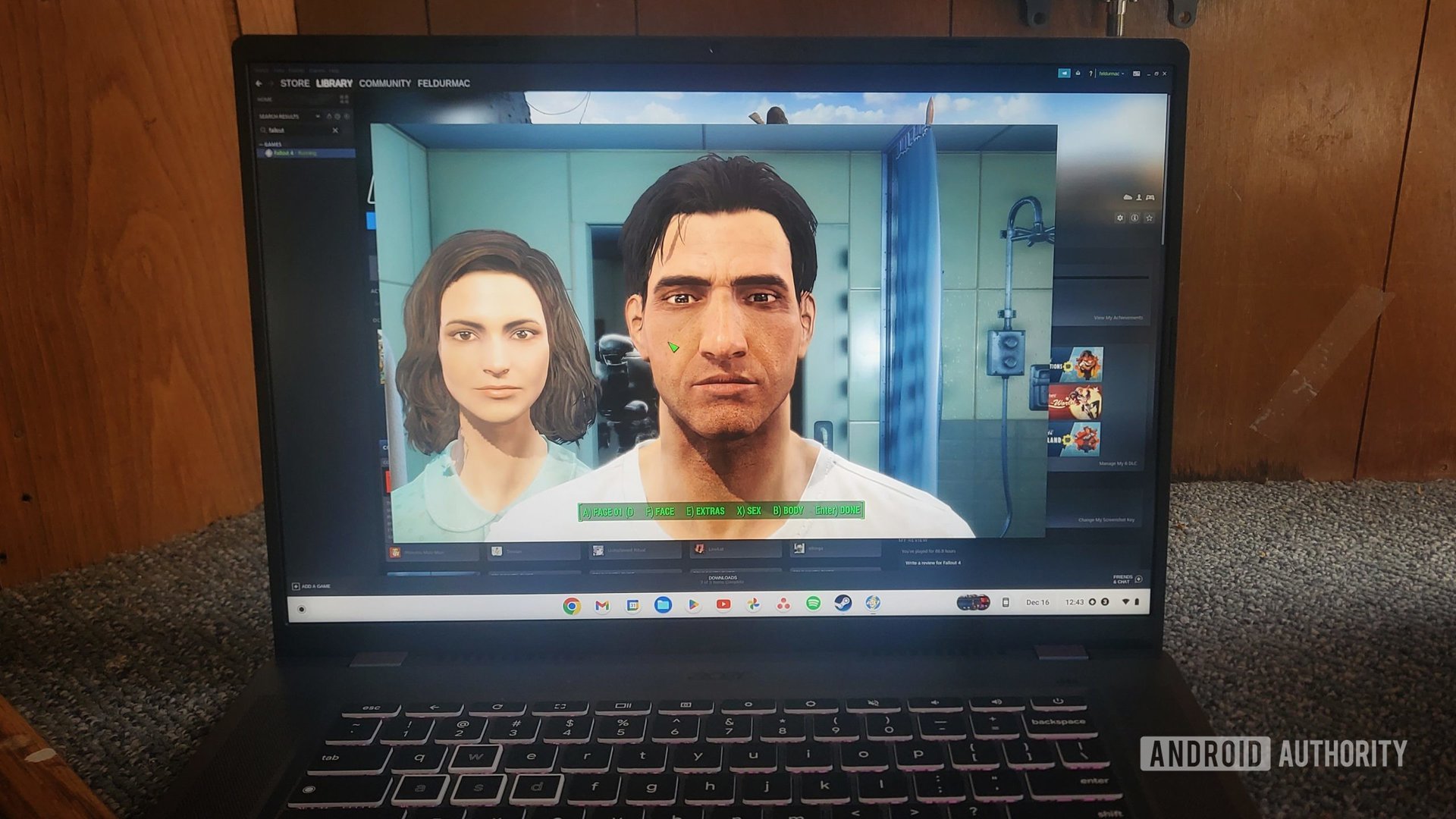
As expected, not all games played nicely. Some of this is down to the Intel Iris graphics just not being up to the job for newer AAA titles. Theoretical future gaming Chromebooks packed with dedicated AMD or NVIDIA graphics would be able to handle even more. Another factor is that Steam is in beta, so there are bound to be plenty of bugs at this stage.
The third issue is that while some games on Steam are natively working on Chrome OS using the Linux compatibility layer, others are basically converting Windows versions and that’s when things get a bit more hit-and-miss. Still, as the Steam Deck (and hopefully gaming Chromebooks) pick up more users, this situation will improve. We’ve already seen Valve work with its partners to bring native Linux support to hundreds of major games, giving the open-source platform the best gaming support it has ever seen in its many decades of existence.
My experience with Steam was so good, sometimes I'd forget that I was actually using a Chromebook and not a Windows PC.
Now just imagine if Google and Valve pooled their resources to help push Linux-based gaming forward. While Microsoft probably isn’t shaking in its boots over this idea, over time it could slowly help Google and Valve catch up to Windows in gaming performance.
A combination of game streaming, mobile gaming, and Steam could make for a deadly combo for Google.
Could a Chromebook ever be a serious competitor to an actual gaming laptop? Probably not anytime soon, if ever. Nor does it have to. Just look at the Steam Deck, which has managed to sell a million units despite limited production runs. There is a market out there for an easy-to-use gaming machine that is capable of playing PC games. A gaming Chromebook adds much more value to the package than the Switch-esque Steam Deck. Yes, you can hook the Deck up to a monitor and use it as a Linux productivity machine, but something like the Acer Chromebook 516GE gives you a fully-fledged laptop that you can use for work, browsing, and much more, without the need for any dongles or accessories.
Timing is one of the biggest mistakes Google is making here
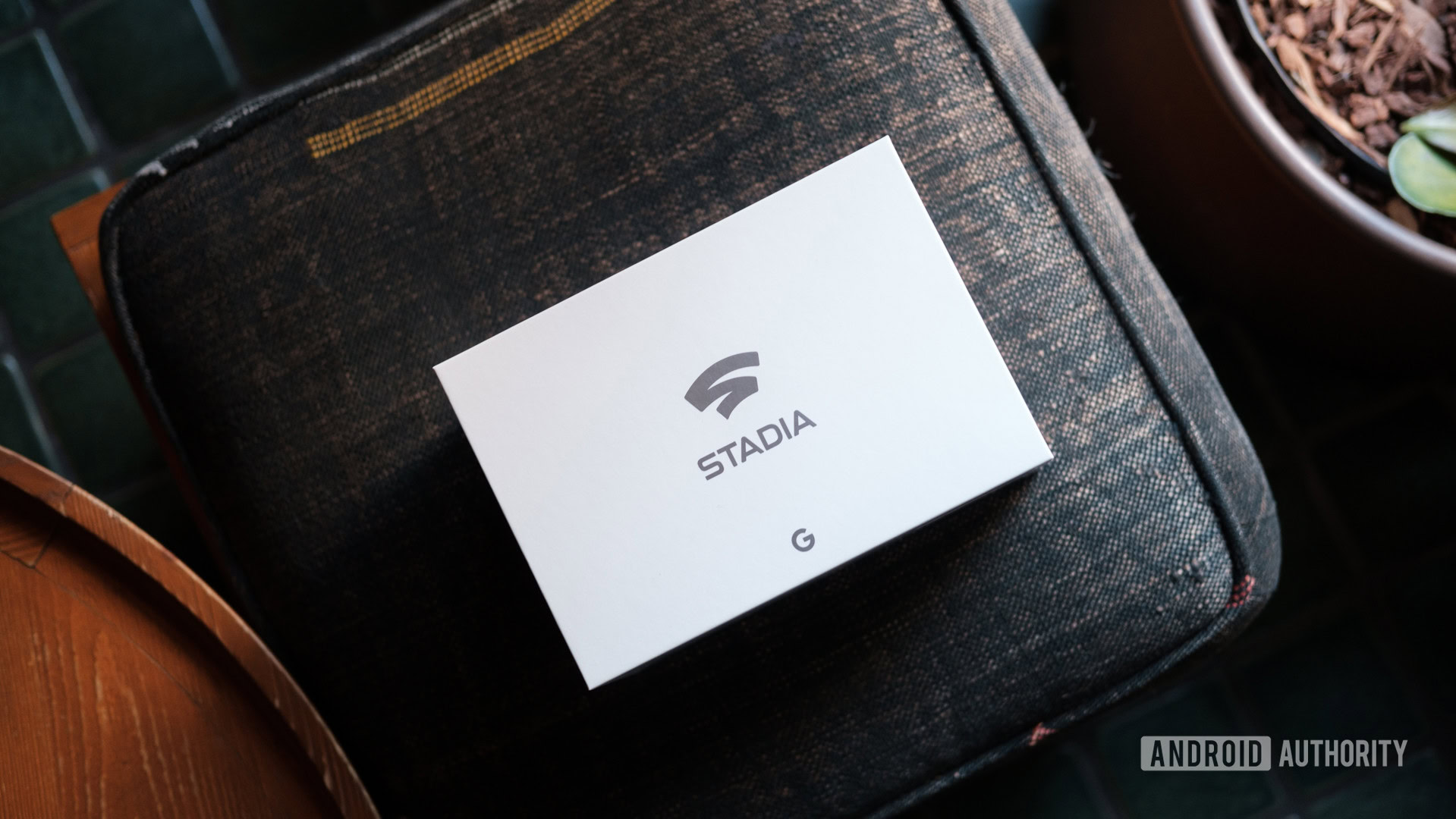
The Acer Chromebook 516GE gave me a taste of what a true gaming Chromebook could be like, but it was far from perfection. I stand behind the idea that a gaming Chromebook could be a good move for Google; the problem is that Google is doing it wrong.
Google’s current approach to gaming Chromebooks has some flaws, but the biggest problem is its timing. The company launched a cloud-first product almost immediately after announcing it was calling it quits on Google Stadia. Although Stadia might not have had the subscriber count Google hoped for, it had its fans. These fans were pretty annoyed when Google pulled the plug, so the odds they are going to run to gaming Chromebooks with open arms? Pretty low, I’d say.
Waiting a bit longer to launch wouldn’t have magically fixed Google’s cloud reputation, but it could have given the company more time to ensure the launch was successful enough that spurned users might still give it another chance. It also might have given Google time to work with its partners on features that would have helped further set the gaming Chromebooks up for success.
I mentioned earlier the Acer Chromebook 516GE works pretty great with Steam and that I believe this should be a key focus for gaming Chromebooks once the feature leaves beta. Waiting longer to launch gaming Chromebooks with its partners could have given Google time to work with Valve and prioritize making Steam ready for the official Chrome OS channel. This would have really helped the machines stand out.
Stadia is dead. Steam isn't ready. Google, you're timing is horrible.
Waiting a bit longer might also have allowed Google to better integrate its streaming partner services into its OS. Amazon Luna, Xbox Gamepass, and NVIDIA GeForce Now are all supported and will come pre-installed with gaming Chromebooks. The apps work really well in my experience, especially with a decent connection. What’s missing is deeper integration into the OS itself. Without that, a gaming Chromebook is just a slightly modified Chromebook with a few pre-installed apps that you could have just sideloaded yourself.
Pixel phones have the Discovery feed you can swipe to right within the launcher, I’d like to see Google and its partners do something similar for gaming Chromebooks. Imagine an aggregated portal where you can find all the best mobile, Steam, and streaming games compatible with your device and start downloading or streaming them right away. It would also be nice to have more advanced gaming features built into Chrome OS settings like overclocking (hey, it could happen), fan speeds, power profiles, and more. Also, imagine seamless notification and chat integration with partner services right into Chrome OS.
While my ASUS ROG Zephyrus G14 doesn’t have tight gaming integration beyond what is provided by Windows already, it does have more advanced settings like different performance profiles, the ability to tweak fan settings, and more. Gaming Chromebooks don’t really add much more customization to the mix than a standard Chromebook.
Although it would have made the most sense for Google Stadia to be the integrated service, using third-party options can be just as effective. As long as there’s real value added to Google’s take on game streaming, that will help gaming Chromebooks stand out from any other device that supports Luna, Xbox Game Pass, or NVIDIA GeForce Now. Right now I’d say that’s definitely not the case.
Should you invest in a gaming Chromebook now?
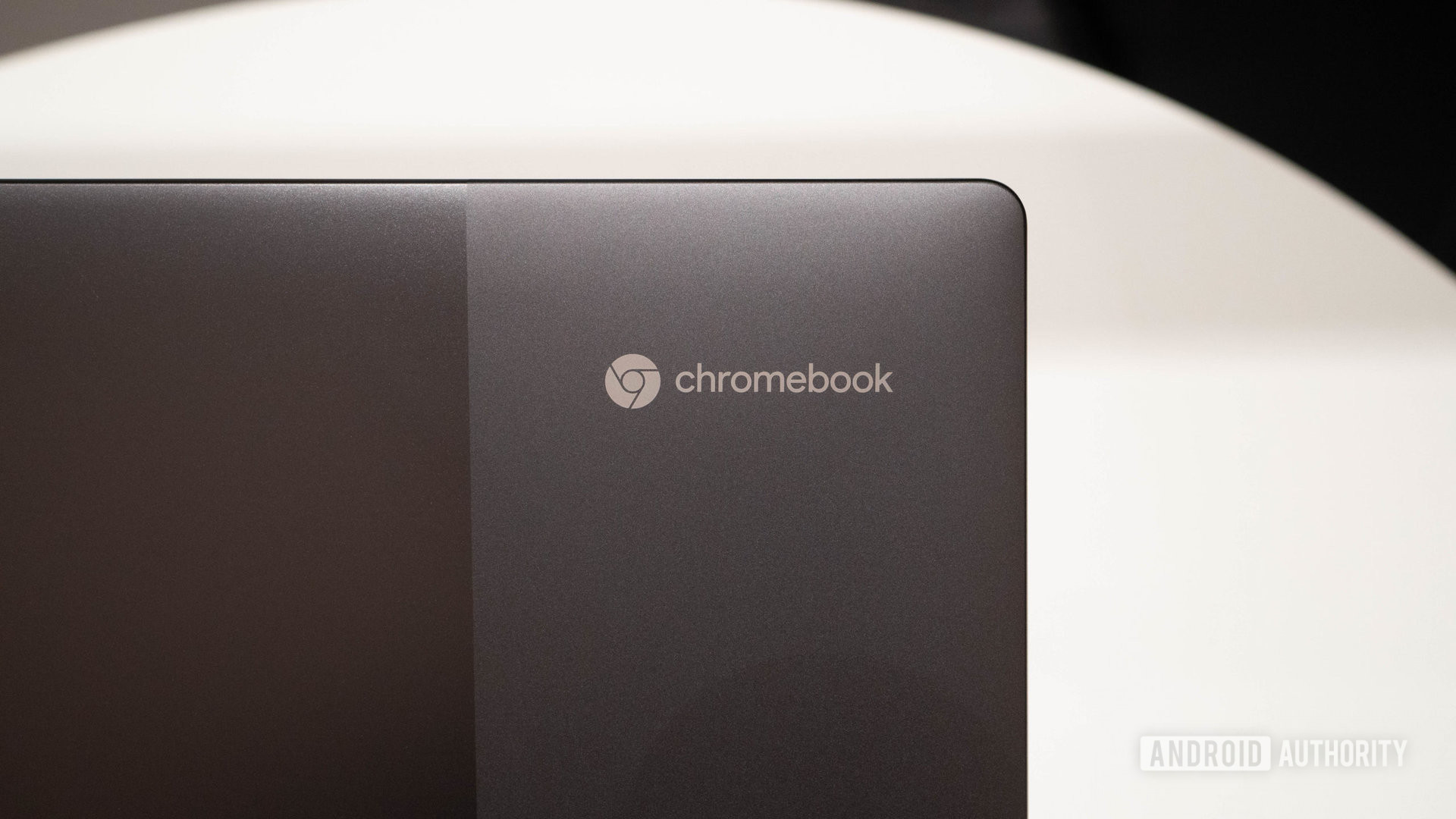
Right now gaming Chromebooks hold plenty of promise, but they are rough around the edges, unless you’re content with gaming streaming as your main way to play. If gaming is your primary use case, I honestly don’t think Chromebooks are there yet.
I do think that gaming Chromebooks could make wonderful productivity machines, though. This is important for those who love productivity Chromebooks, as there haven’t been that many great options recently. While I can’t vouch for ASUS or Lenovo’s options, the Acer Chromebook 516GE absolutely blew past my expectations when it came to day-to-day use. It handled photo editing, writing, editing, video conferencing, and much more without skipping a beat.
If you consider yourself a Chromebook user but are bummed by the lack of high-end Pixelbook laptops in 2022, gaming Chromebooks are a worthwhile substitute. Just understand the gaming experience isn’t going to be perfect — yet.
